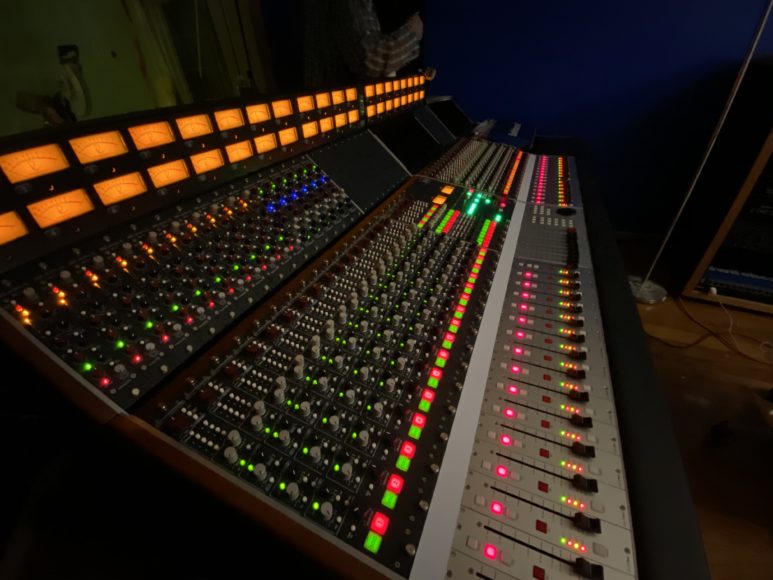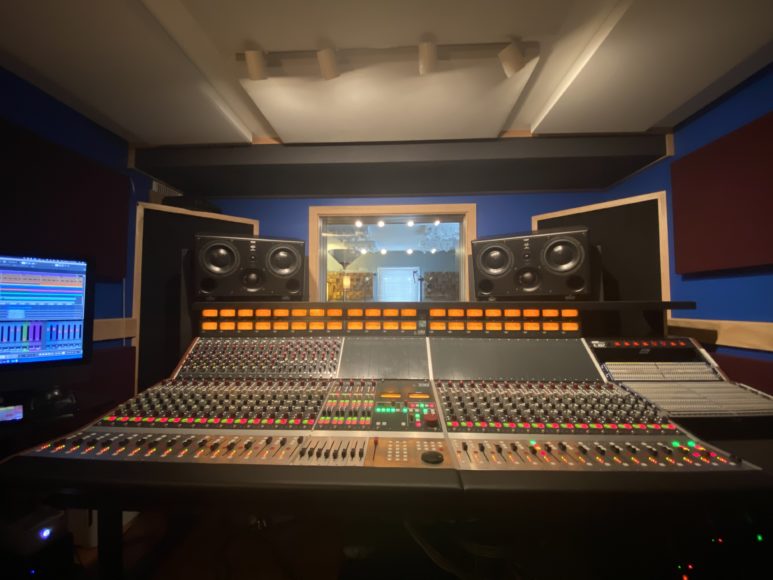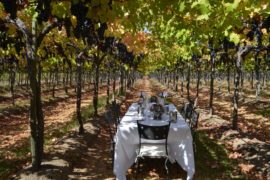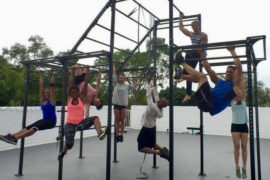Amid all the ongoing bad news about the Covid-19 variants, vaccination resistance and the effect being felt by performers and performance venues, there is some good news. Musician, producer and engineer Gordon Bahary has opened a state-of-the-art recording studio here in Westchester County. It’s good news because, while people may or may not be able to attend live music events, at least they can listen to recorded music at home. With that in mind, Bahary’s Electric Kingdom Studios is said to offer “the warmth of yesterday with the clarity and dynamic range of today,” featuring such homey amenities as “Persian rugs, pianos and warm, earthy colors,” as well the convenience of being close to New York City. The equipment, including the new Rupert Neve 5088 32-channel console (pictured left), speaks for itself. Gordon was gracious enough to answer a few questions about his career and Electric Kingdom Studios for WAG:
Gordon, you’re a Long Island native. How old were you when you took your first music lesson?
“I took a few piano lessons when I was about 10 years old but quit after a few. I wanted to write my own music.”
How many other instruments, if any, do you play in addition to piano and other keyboards?
“A little drums and lead and background vocals.”
By your teens, you were fortunate enough to have brushes with greatness, including Stevie Wonder and the late Harry Chapin. Looking back on those experiences, how formative were they in terms of the musician you are today?
“They played a huge role. Stevie was like a father to me, both in terms of a role model in the studio and as a human being who always cared about others. With Stevie, I was more focused on sound and music. Harry Chapin opened my mind about real-life lyrics and story songs. There was a vulnerability in his stories that encouraged me to be more honest with myself.”
The Electric Kingdom Studios gets its name from the 1984 “Electric Kingdom” freestyle single you recorded under the moniker Twilight 22. What can you tell me about the music you were making at that time?
“I liked the energy of the records at that time. There were a few driving forces in music then, namely dance music and rap. We were coming out of the ’70s with Carole King, the Bee Gees, the Eagles and so many great pop and rock artists. It was also a strange time because we didn’t know where music would go. Electronics was also affecting this more and more.”
How much did being a musician play into your decision to open a recording studio?
“A great deal. I wanted to not only have the ideal studio for my own records I produce or mix, but also for my own recordings. It’s a dream studio with every color and texture available at your fingertips.”
How was Westchester selected as the site for Electric Kingdom Studios?
I spent 30 years in the city, both living there and having my studio in SoHo. I love Manhattan. This is definitely a more relaxed atmosphere.”
In the press materials, you not only talk about the studio’s proximity to the city, but also the fact that there is off-street parking. What else made the Westchester location appealing?
“Being able to go for a walk near the woods to air your head and think about your ideas is a great asset. The quiet lets you hear the music in your head. Fresh air, walk right in, but also the city is only 30 minutes away for some players or producers who come here.”
How was the space acquired?
“Since it’s a private studio for my use as a producer and mixer, I made it part of a house.”
Were you able to utilize local contractors and such for the build out of the studio?
“I have a great contractor from my previous studios in Manhattan. I designed it and we built it together.”
What are the challenges of opening a recording studio during a pandemic?
“Of course, it was quieter in terms of in-person recording. So, I focused more on mixing and mastering during most of the pandemic. Also, to compose my new album. Turns out there was a lot of good music written by many musicians during lockdown.”
Would it be fair to say that one of the rewards is that while live performance is still in the process of recovery, people can still listen to recorded music at home, so that functions as one of the services provided by the studio?
“That’s a very good point. Music equipment retailers had a banner year in 2020. People set up small studios at home for writing, vocals and some production. I am now mixing work that was recorded in people’s homes and giving it the touch that it needs for commercial release.”
What are you most looking forward to, in what will hopefully someday be a post-pandemic world, when it comes to being a musician, as well as a studio engineer?
“My goal is to provide a music sanctuary for artists and producers that is the most comfortable in terms of equipment, rooms and atmosphere. I look forward to collaborating with talented people and helping their vision become a reality. I like being flexible and applying myself to any genre, personality and challenge. That’s part of the art that I love. Not to mention that music is not only beautiful but healing as well. Something we all need more of.”
For more, visit electrickingdom.com.





